India’s ‘Look East Policy’ concern for Burmese
India the largest democracy in the world has always been maintaining good relationship with its neighbors like Bhutan, Nepal, Pakistan, Bangladesh, Sri Lanka and Burma. The efforts are continue for a peaceful co-existence with all its neighboring countries. At a time when this country pleads for democracy in other countries and has welcomed the democratically elected governments in Nepal, Pakistan and Bangladesh, its attitude towards Burma (Now Myanmar) seems a bit different. This shift in its policy took place during the year 1990, when India launched its “Look East Policy” and began to support the military junta in Burma. Since India has embarked upon building a broad based relationship with the military junta including cooperation on defense, trade and investment, energy and natural resources, a series of agreements and Memorandum of Understanding (MoU) have already been signed, such as the construction of Sittwe port, the multi model Kaladan project and Energy and Petroleum Cooperation. India’s closer relationship with Burma’s junta and its cold approach to the people’s movement for human rights and democracy in Burma has raised concern amongst Indian civil society as they question whether India has abandoned the principle of humanist and idealist policy guided by Mahatma Gandhi and Jawahar Lal Nehru. Burma Centre Delhi, an organization formed by members from India and Burma civil society groups is out to work for restoration of peace justice, democracy and human rights in Burma. It still believes India is an important neighbor that can influence Burma in bringing about a democratic transition acceptable to the people of Burma. It may be recalled here that Burma was under British colonial rule for more than one hundred years. Since its independence on January 4, 1948 this country practiced a democratic parliamentary system under the leadership of the premier U Nu. This system continued for fourteen years only, when Burmese army staged a military coup overthrowing the democratically elected government and imposing oppressive military rule. The coup instigators, namely, the Revolutionary Council led by General Ne Win, abolished the constitution and suspended all democratic rights of the people. All legislative, executive and judicial powers were vested in the hands of Gen Ne Win. The military used guns to control the country according to their wishes, keeping a tight lid on the political activities of those who love democracy in the country. The military regime transformed itself into a ruling political party in the year 1974, which was named the Burmese Socialist Program me Party (BSPP). The BSPP ruled over the country for fourteen years until 1988, with single party dominated political system with the ideology ‘the Burmese way to socialism’. During these years the country became one of the poorest countries in the world. Therefore, in 1987 Burma was listed as a least developed country (LDC) by the United Nations. Due to deterioration of Burma’s economic situation and oppressive one political party rule on August 8, 1988, which is known as 8-8-88, the people (workers, monks, peasants, teachers, government servants and youth) of Burma led by the university students at Rangoon rose up as one to call upon the military rulers to abolish the ill-reputed one party system, demanding democracy and human rights in the country. The military responded with bullets against the peaceful demonstrators and killed more than 3,000 demonstrators throughout the country. After 8888 incidents, Gen Saw Maung took over the country on 18th September 1988 and renamed the ruling regime the State Law and Order Restoration Council (SLORC). Therefore in 1989 under the SLORC Burma was renamed as Myanmar to divert international attention and criticism. A multi-party general election was held in May 1990, in which the National League for Democracy (NLD) won a landslide victory. However, the military ignored the election results and did not hand over the people’s mandate to the winning party, instead imposing authoritarian rule and violently cracking down on the people’s pro-democracy movement. In spite of the repressive military rule for about fifty years the people aspiration for peace, dignity and democracy continues till now and Burmese people hope that India can play a better role to bring democracy back in their country.
Other Contents by Author
To bring discipline in a society either the citizens should be conscious themselves or the law enforcing authorities should be prepared to make them disciplined. It may be a hard step for the time being, but in the long run result would be beneficial to both the human beings and the society. In present days we find lack of sense among the people to go through the legal means of life and improving the deteriorating standard of the society. Violation of laws has become a fashion now-a-days.Smoking in the public places has been banned since Gandhi Jayanti, on October 2 last. This is not the first time that it is prohibited by law, but the law enforcing authorities lacked will power to...
Guwahati Municipal Corporation (GMC) has been totally failure in providing basic amenities to the citizens of the city. Despite getting sufficient funds from both the Central and state governments, it is not in position to meet the requirements of tax payers, small traders and other business houses, which are the major source of revenue to its coffer. An appeal from a citizen for providing basic amenities is turned down by the authorities on the ground that the GMC has no fund for the same. Instead of providing amenities and developing the sources to benefit the tax payers, GMC proposes to hike the rate of taxes and levies from time to time, on those who already bear the brunt of existing...
At last the Assam Chief Minister, Tarun Gogoi has realized that the situation in the state is not as he had dreamed so long. The opposition parties and various Non-governmental organizations had 'cried out' on explosive situation in the state frequently and tried to awake the administration for doing something to protect the lives and properties of the people, which passed through deaf ears and failed to give result. In fact the state has not enough security personnel which could be effective to protect the people from such incidents, but this was not realized by the government.Earlier, on the complaints of the Human Rights Commission, regarding violation of human rights by Army and...
It was Thursday the 30th October 2008, when Assam Pradesh Congress Committee (APCC) was organizing a ‘Gandhi March’ from the party headquarters at Rajiv Bhawan to Mangaldoi, the headquarters of Darrang district. The march started at 9 a.m. and proceeded by road for propagating the message of ‘peace and non-violence’, which is central to Gandhian philosophyThe citizens’ life was normal till then and the people came out of their houses for their work places unaware of any untoward incident likely to happen without notice. The weather was pleasant and office goers were busy rushing for their work. It was a busy day for courts, schools and colleges, markets and...
It is more than twenty-three years now, the Assam Accord was signed between the Government of Assam and the movement leaders, who propelled an agitation for long six years demanding detection and deportation of illegal migrants from the state. The signing of Accord could not have been possible without involvement of the Union government as the movement leaders had lost confidence on the intention of the state government, which was continuing on the strength of such 'vote banks' of the migrants. The erstwhile, Prime Minister, Rajiv Gandhi took initiative to bring peace in the state as the people were fade up with such a long agitation. It was an Independence Day gift for the people of Assam...
An incident of recent communal violence in Udalguri district has bred a number of questions to argue between the administration and opposition parties as well as media. The issue of Pakistani flag hoisting in Mohanpur at Jargaon playing ground on October 4 last has raised a number of questions about the incident. First of all the chief minister, Tarun Gogoi, going through the media reports flatly dismissed the report of hoisting Pakistani flag. Following the publication of photographs in the newspapers and video clippings shown by the electronic media, the government spokesperson and health minister, Dr Himanta Biswa Sarma tried to defend the administration by over ruling the claims of...
The last two decades have seen a mushroom growth of the Fourth Estate in the northeastern region in general and Assam in particular. There is no doubt that due to this haphazard growth the demand for the media persons has increased, but their functioning in general, has fallen short of the set journalistic norms. With information technology witnessing a fast pace development, the media houses have not been able to get competent and trained workforce to cope with the increasing demands of this ever expanding and fast changing sector. The vacuum created by such situations has given birth to 'neo-journalism'. This is just a 'stopgap' arrangement for the unemployed educated youths.The majority...
The International Day of Non-violence and the holy Id-ul-fitre festival, both observed simultaneously on October, 2, 2008 and perceptive to communal harmony did not prove its worth so far the situation in a part of Assam is concerned. It was a day of violence in the district of Udalguri under the Bodoland Territorial Council (BTC), which spread to Darrang district and other areas around it as wildfire which led more than fifty innocent people including children and women killed and hundreds others injured. When Udalguri was burning, the state government was sleeping. Its slumber came to an end when a number of organizations flayed for its role at this critical juncture of the situation.A...
It's tragedy with our politicians who try to turn their failures on the others, especially before the elections. Mud slinging is very common to divert the attention of the electorate. The recent visit of Bharatiya Janata Party (BJP) leader Lal Krishna Advani to the states of Assam and Meghalaya has brought excitement for Assam chief minister, Tarun Gogoi, who has tried to put blame of failures to check illegal migrants influx on the six years rule of BJP-led National Democratic Alliance (NDA), which ruled at the Centre from March 1998 to May 2004. Since the BJP and the Asom Gana Parishad (AGP) are coming closer in view of the ensuing Lok Sabha elections early next year, the chief minister...
With the joining main stream of the nation by more than three hundred ULFBV militants at the end of September last, the situation on the borders of Assam and Mizoram is likely to be peaceful. The efforts of the Hailakandi district administration and other agencies have done a commendable job to bring the militants on the right path. The situation on the inter-state borders of the southern Assam and Tripura's northern part with Mizoram was explosive for a long time after the Reangs tribal began their struggle for identity and existence, when they were driven out of Mizoram by the activists of Mizo Students Association (MSA) and Mizo Zirai Pawl (MZP). This led the Reangs to shift their...



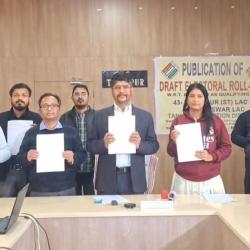
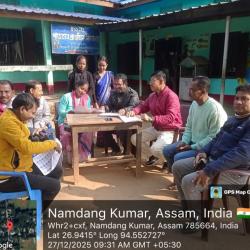
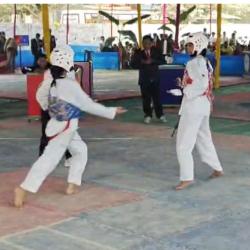
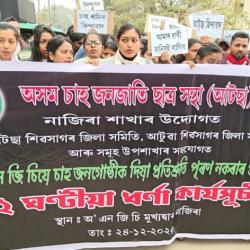
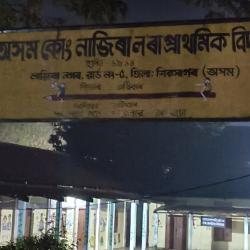
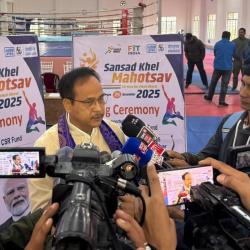

Comments
Pages
Add new comment